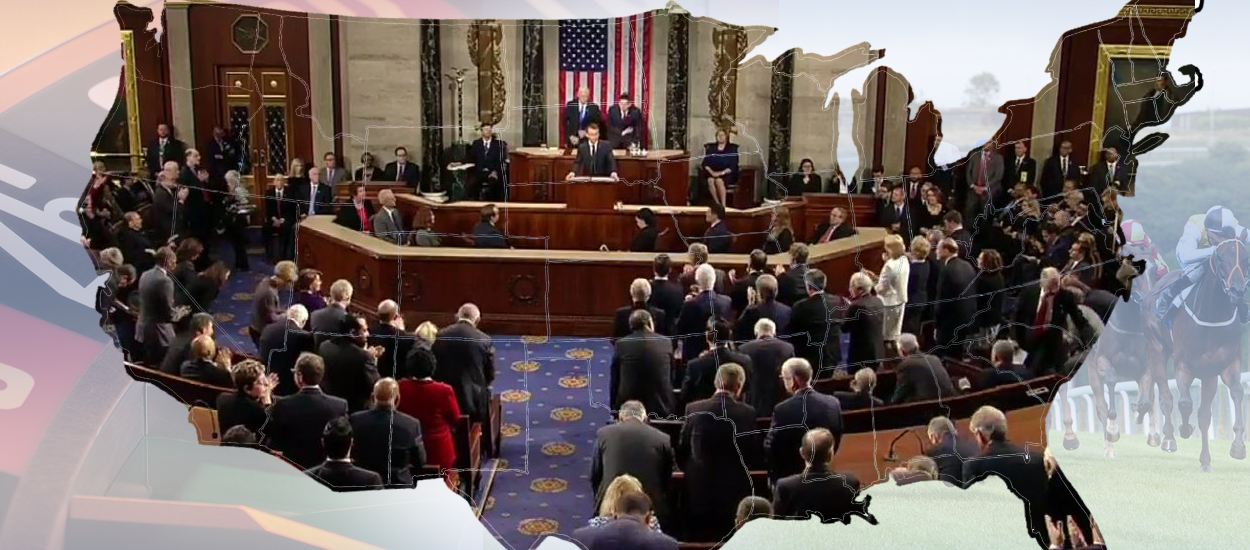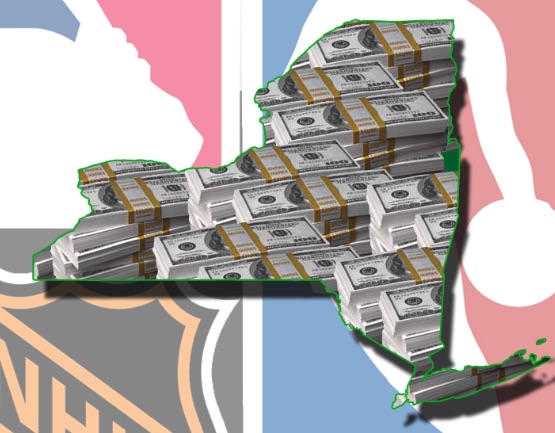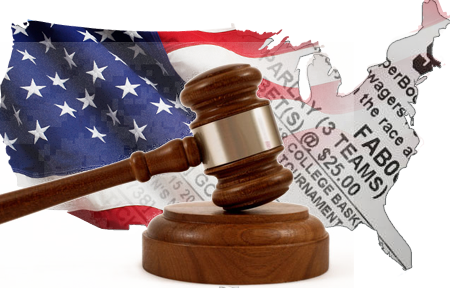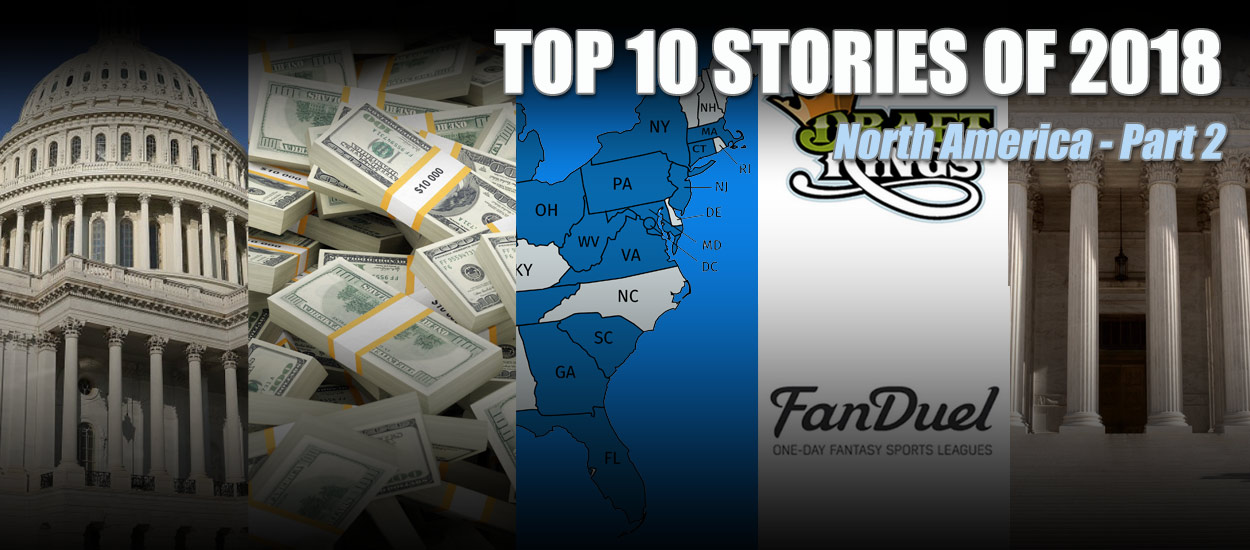One topic dominated the news for gambling in 2018 and it affected many states, companies and bettors in different ways. Consequently, it makes up the top 5 stories of 2018. That issue of course is the Supreme Court decision on PASPA and the new possibilities for sports betting in the United States and its possible implications for Canada as well. While the top 5 stories relate to the SCOTUS decision, each story is independent because they address different issues that stem from the monumental decision.
5. A push for a federal sports betting bill
Not long after SCOTUS repealed PASPA, many on Congress looked to implement a new federal sports betting bill. Orrin Hatch, a Republican Senator from Utah and one of the politicians behind the original introduction of PASPA set up a Senate Judicial Committee meeting to educate other Senators on the dangers of state-by-state laws. Hatch wrote an article in Sports Illustrated that effectively said that states are unable to truly maintain integrity because corruption will cross state lines. He concluded the article with the following:
"Through balanced legislation, I believe we can create federal standards that not only align with constitutional principles but also uphold the integrity of the sports we love. Such standards would be straightforward and noncontroversial, including measures to prevent underage gambling and assurances that players, referees and coaches will not participate in sports betting." The arguments made by Hatch were almost identical to the ones he made prior to the passing of PASPA in 1992, although the Internet was in it's infancy at that time. While it’s hard to believe that many on Capitol Hill would really consider introducing a new federal law in light of the one just being struck down, Hatch has apparently convinced many in the Senate and in Congress from both parties to support his motion and the midterm election results could actually help his cause. Congress is now dominated by Democrats and as was noted before it is Liberal politicians that have tried to suppress expanded gambling in the past on the grounds of harm reduction. And several analysts noted that many new Democrats in Congress are very liberal and are likely not federalists by any means. Consequently, it may be easier now than before to get enough on Capitol Hill to support a new federal law. Along with Hatch, the NBA and MLB are supporting federal legislation (albeit they seem to want it to get their integrity fee included - see below) and many casino operators are supporting federal legislation to try and get uniformity on taxes and to help with their push for federal legislation with online casino betting, which they believe is their real bread and butter. As well the NCAA apparently is supporting federal legislation, since they don’t want any betting on amateur sports and believe that as part of federal legislation, they can demand that betting be restricted to professional sports and exclude college students from wagering.
The arguments made by Hatch were almost identical to the ones he made prior to the passing of PASPA in 1992, although the Internet was in it's infancy at that time. While it’s hard to believe that many on Capitol Hill would really consider introducing a new federal law in light of the one just being struck down, Hatch has apparently convinced many in the Senate and in Congress from both parties to support his motion and the midterm election results could actually help his cause. Congress is now dominated by Democrats and as was noted before it is Liberal politicians that have tried to suppress expanded gambling in the past on the grounds of harm reduction. And several analysts noted that many new Democrats in Congress are very liberal and are likely not federalists by any means. Consequently, it may be easier now than before to get enough on Capitol Hill to support a new federal law. Along with Hatch, the NBA and MLB are supporting federal legislation (albeit they seem to want it to get their integrity fee included - see below) and many casino operators are supporting federal legislation to try and get uniformity on taxes and to help with their push for federal legislation with online casino betting, which they believe is their real bread and butter. As well the NCAA apparently is supporting federal legislation, since they don’t want any betting on amateur sports and believe that as part of federal legislation, they can demand that betting be restricted to professional sports and exclude college students from wagering.
But it’s not just in the U.S. that federal legislation is being proposed for sports betting. In Canada, an MP from Windsor, Ontario reintroduced a bill to amend a federal law that prohibits single game sports betting. The bill was first proposed in 2010 by Joe Comartin and passed in the House of Commons with all party support. But the Senate killed the bill in an effort to justify their jobs and to appease the NHL. It was reintroduced in 2016 by Brian Masse but was defeated by a 155-133 margin in the House of Commons. But that bill has now been reintroduced by Tracey Ramsay who said that the bill must be passed not only to help increase interest in casinos and to help the fledgling casino industry, but also to keep up with the United States. Tracey stated that with PASPA struck down it is only a matter of time before New York, Michigan, Massachusetts and other border states legalize sports betting. And if that is the case Canadians will flock over the border and wager at U.S. casinos and racetracks because they can bet on single games there. She stated the obvious that the current Canadian sports betting lotteries don’t attract enough interest to sway people from betting in the U.S. Ramsay also noted that sports leagues, including the NHL have set up partnerships with casinos in the United States, so their previously stated objections no longer are valid.
4. The ongoing fight over integrity fees
When NBA Commissioner Adam Silver first announced in 2015 that he was in favor of sports betting he was met with scorn by most of the other league commissioners. After all, what he was supporting was contrary to statements by all leagues for decades prior. Silver said he was not so much pro sports betting but was just a realist. However, after SCOTUS announced their intentions to hear the New Jersey arguments regarding PASPA, Silver announced that he wanted a 1% integrity fee on all wagers made on NBA games. MLB followed suit with a request for integrity fees and, while no other leagues came forward ,it was the belief that the NHL and NFL would give up their objections to sports betting if they were given the fee as well. Only the NCAA was believed to be opposed to any betting on its sports under any circumstances. Dan Spillane, a lawyer for the NBA stated the following:
"Without our games and fans, there could be no sports betting. And if sports betting becomes legal in New York and other states, sports leagues will need to invest more in compliance and enforcement, including bet monitoring, investigations, and education. To compensate leagues for the risk and expense created by betting and the commercial value our product creates for betting operators, we believe it is reasonable for operators to pay each league 1% of the total amount bet on its games."
While 1% doesn’t sound like much, Silver wanted 1% of every single wager made which equates to 20% of gross profits. Some states indicated at the time they were ok with it, but the majority aren’t. Among those who absolutely refused to support an integrity fee and still do is New Jersey which effectively said that they aren’t going to reward leagues who fought them every step of the way and only want in now that the repeal has gone through. As one writer said, "the leagues asking for the integrity fee when it was clear that PASPA was almost certain to be repealed is like a worker who has opted out of an office lottery pool saying he wants in after the fifth number is drawn from the drum and a ticket in the pool has all 5 numbers matching correctly." And New Jersey Senator Steven Sweeney questioned what they would possibly be doing differently. "Their demand begs the question of what they would now start doing to preserve the integrity of their games that they have not been doing for years."
Despite the objections, the NBA and MLB have continued to ask for the fee and said they would only support legislation in states that have it. An MLB spokesman stated the following: "We will use our expertise, rights and footprint to help the states that have smart and modern sports betting laws develop the country's most successful betting markets within a regulatory framework that protects the integrity of our games, which is most paramount." In recent months, realizing there is no recourse for the leagues, the NBA and MLB lowered the requested integrity fee to 0.25% (5% of gross revenue) which still had many states shaking their heads although a New York Senator issued an amendment to a state sports betting bill that would provide a 0.2% integrity fee (approximately 4% of revenue) with the proviso that the leagues indicate what they are doing to earn it. In better words the Senator wants a line by line account of what they are spending to promote integrity in their sports and wants proof these are new initiatives that have only been implemented as a result of legal sports betting. Many states apparently have applauded that decision and are prepared to offer a similar deal to the leagues if and when they introduce legal sports betting.
In recent months, realizing there is no recourse for the leagues, the NBA and MLB lowered the requested integrity fee to 0.25% (5% of gross revenue) which still had many states shaking their heads although a New York Senator issued an amendment to a state sports betting bill that would provide a 0.2% integrity fee (approximately 4% of revenue) with the proviso that the leagues indicate what they are doing to earn it. In better words the Senator wants a line by line account of what they are spending to promote integrity in their sports and wants proof these are new initiatives that have only been implemented as a result of legal sports betting. Many states apparently have applauded that decision and are prepared to offer a similar deal to the leagues if and when they introduce legal sports betting.
The main concern that states have with offering integrity fees is that the profits on sports betting are not as high as traditional gambling games like slots or blackjack and sports betting assumes a lot of risk that casino games do not. As such, any integrity fees would have to be built into the odds which in turn would hurt bettors and may make states noncompetitive with offshore companies.
Regardless, New Jersey, Delaware, Connecticut, Pennsylvania and Nevada indicated they have absolutely zero intention of giving the leagues any revenue for promoting integrity while Indiana, Illinois and Missouri seem prepared to include an integrity fee if, and when, sports betting is legalized.
3. State progression with sports betting, tax rules and infighting As soon as SCOTUS announced its decision to repeal PASPA some states, which had already passed sports betting bills, started offering the product. Delaware, which had already been offering parlay betting on the NFL due to a carve out in PASPA, altered paths and allowed single game betting on all sports. In June, just one month after the SCOTUS decision, the first bet was placed by governor John Carney, a $10 wager on the Philadelphia Phillies to beat the Chicago Cubs and shortly thereafter bets poured in at the 3 racetrack/Casinos of Delaware Downs, Dover Downs and Harrington Raceway. Not long after Delaware introduced sports betting, New Jersey followed suit allowing bets at racetracks, Atlantic City casinos as well as online. DraftKings, Fan Duel, William Hill (partnered with Monmouth Park and Oceans Resort), MGM (partnered with Borgata) and SugarHouse Casino, which partnered with the Golden Nugget, all have offered online sports betting. PokerStars, 888 and Tropicana only allow sports bets at their land based casinos. Rhode Island, West Virginia, Mississippi, New Mexico and Pennsylvania also began offering sports betting at physical locations only. Outside of New Jersey, William Hill seems to be running the vast majority of sportsbooks in the remainder of the United States.
As soon as SCOTUS announced its decision to repeal PASPA some states, which had already passed sports betting bills, started offering the product. Delaware, which had already been offering parlay betting on the NFL due to a carve out in PASPA, altered paths and allowed single game betting on all sports. In June, just one month after the SCOTUS decision, the first bet was placed by governor John Carney, a $10 wager on the Philadelphia Phillies to beat the Chicago Cubs and shortly thereafter bets poured in at the 3 racetrack/Casinos of Delaware Downs, Dover Downs and Harrington Raceway. Not long after Delaware introduced sports betting, New Jersey followed suit allowing bets at racetracks, Atlantic City casinos as well as online. DraftKings, Fan Duel, William Hill (partnered with Monmouth Park and Oceans Resort), MGM (partnered with Borgata) and SugarHouse Casino, which partnered with the Golden Nugget, all have offered online sports betting. PokerStars, 888 and Tropicana only allow sports bets at their land based casinos. Rhode Island, West Virginia, Mississippi, New Mexico and Pennsylvania also began offering sports betting at physical locations only. Outside of New Jersey, William Hill seems to be running the vast majority of sportsbooks in the remainder of the United States.
Revenue in all states has apparently exceeded what was expected, but there are still a lot of arguments between states and sportsbook operators over online betting and taxation. Reports have suggested that William Hill is encouraging all states to move quickly to allow online wagering since most bettors prefer to wager via the internet and without that option they believe bettors will continue to wager offshore rather than at state sponsored sportsbooks. As well the inconsistencies of taxation and licensing fees are frustrating many casinos and are also causing a lot of infighting in other states. New Jersey does not require casinos to pay any additional fees to operate a sportsbook and charge an 8.5% tax on revenues for any land-based sports bets and 13% for any sports bets placed online. On the other hand, Pennsylvania has initiated a $10 million license fee and charges a 36% tax on all sports wagers and in Rhode Island sports betting revenue is allocated with 51% of all revenue going to the state, 32% to IGT and only 17% back to the sportsbook operator. Most analysts feel the ridiculous tax in Pennsylvania and the low return to the sports betting companies in Rhode Island will make it unprofitable and those states will have no option but to lower their taxes or see the sports betting companies withdraw. This confusion over how much to tax, whether to include license fees and who should be allowed to operate sports books has apparently caused many states to pause plans to offer legal sports betting. New York has had a sports betting law in place for some time, but has yet to take a sports bet for that exact reason. The New York Racing Association is fighting with the state legislators over whether Tribal Casinos should be allowed to offer sports betting in the state or whether it should only be allowed at racetracks and the Tribal groups are making similar claims. And, both groups are fighting with the state over how much of the revenue should go to the states and how much to the sportsbook operators. A similar situation has taken place in Connecticut, which was expected to be one of the first states to offer sports betting but has yet to do so.
Up to 17 states have passed some sort of legislation to at least study sports betting but for various reasons the bills have stalled and the expectation is that only 5 states have a real chance of passing a sports betting bill in 2019, including New York, Connecticut, Massachusetts, Michigan and Kentucky. California which would be the largest benefactor of sports betting appears to be years off in enacting a sports betting bill for the exact same reason that online poker has stalled so badly – fighting between the state, racing industry and Tribes. In the meantime, all analysts agree that as long as sports betting remains illegal in most large states and as long as taxes remain high, the majority of wagering by American citizens on sports will continue to be made offshore.
2. A new direction for FanDuel and DraftKings
After the scandal in 2015 that implicated a DraftKings employee for insider betting on fantasy sports games at FanDuel, along with other improprieties by DraftKings workers, many states sought to regulate or even shut down daily fantasy sports. Several state AGs announced that DFS was gambling and violated the state’s constitution and New York’s AG, Eric Schneiderman went a step further and sued the sites for what he called deceptive practices and advertising. The 2 DFS sites withdrew from most states that asked them to and that loss of revenue along with costs from the lawsuits increased their expenses drastically to the point where they were losing money. The sites tried to increase profits by lowering the payouts on contests, but this only chased away big players and lowered overall revenue. DraftKings fared better than FanDuel thanks to its implementation of single game contests and forays into non-team sports like golf and NASCAR, but neither side could get close to a break even, so in 2016 the sites announced their intentions to merge in an effort to combine resources and lower overall costs.
That decision was shot down by the Federal Trade Commission in 2017, which claimed that since the two sites made up 95% of all DFS wagering in the U.S., a merger would violate anti-monopoly laws. The sites made some changes and it did help improve interest in their products and limited losses in 2017, but the SCOTUS decision to hear New Jersey’s case also created a whole new lifeline for both companies. Two states that introduced sports betting bills indicated their intentions to allow DFS sites to run the sports betting operations and both companies stated they had the capability to do so and would welcome the opportunity since sports betting has longer proven profitability than DFS. With the belief that SCOTUS was about to change the laws on PASPA, DraftKings appointed UK sportsbook platform creator Sean Hurley as head of sportsbook operations with the role of building, launching and driving a sports betting vertical for DraftKings. In 2018 DraftKings announced a partnership with Resorts Atlantic City, since the New Jersey law requires any gambling company to have a physical location in New Jersey or partner with a company with a physical location. A while later DraftKings also announced a partner agreement with Kambi group, to create the software platform for online sports betting. Kambi has supplied sports betting software at various sites in Europe.
With the belief that SCOTUS was about to change the laws on PASPA, DraftKings appointed UK sportsbook platform creator Sean Hurley as head of sportsbook operations with the role of building, launching and driving a sports betting vertical for DraftKings. In 2018 DraftKings announced a partnership with Resorts Atlantic City, since the New Jersey law requires any gambling company to have a physical location in New Jersey or partner with a company with a physical location. A while later DraftKings also announced a partner agreement with Kambi group, to create the software platform for online sports betting. Kambi has supplied sports betting software at various sites in Europe.
FanDuel, on the other hand, went a different route. Originally the company was preparing to take the same route as DraftKings, but after the SCOTUS decision was announced in May of 2018, FanDuel announced a merger with Paddy Power Betfair. Under terms of the agreement Paddy Power Betfair paid $158 million to FanDuel for 61% of the company and allocated all its U.S. assets to a new company called FanDuel Group. That group includes all U.S. holdings of Paddy Power Betfair including the TVG Network, the Betfair Casino, Fan Duel DFS and the new sports betting company. The intention is for Paddy Power Betfair to increase its stake in Fan Duel Group to 100% by 2022. Apparently, Paddy Power Betfair believed there was goodwill in the FanDuel name and believed they could turn the DFS product around. The move seemed to be in the works starting in 2017 when DraftKings founder and CEO Nigel Eccles stepped down to start an eSports company and was replaced by Matt King, who was CFO for DraftKings previously, and spent the last two years with an investment firm. King is the CEO of the new Fan Duel Group although it’s uncertain how long he’ll stay in charge of the company. FanDuel sportsbook has partnered with Meadowlands Racetrack in New Jersey.
Both DraftKings and FanDuel sportsbook now have online sites as well and as has been the case with the DFS product, DraftKings has offered betting on nontraditional events like eSports and competitive eating while DraftKings has stayed away from them to err on the side of caution. Both companies have seen excellent results in early betting.
1. SCOTUS decision on PASPA The gambling industry was rocked midway through 2017 when the Supreme Court of the United States said it would hear New Jersey’s request to have PASPA repealed on grounds that it hindered the state to implement gambling rules in the way it wanted. When SCOTUS made that announcement it was clear that the courts were prepared to do something with sports betting, but what? Some analysts suggested that SCOTUS was going to rule against New Jersey once and for all and lay the sports betting question to rest for good; some analysts suggested that the courts would rule for New Jersey and allow them to introduce sports betting, but would then say that all other states were banned forever from seeking legal sports betting; and some analysts thought it would be a full repeal. Prediction sites originally had the full repeal as the favorite but as rhetoric took over and the Supreme Court heard the case in December 2017, the odds shifted away from a full repeal in favor of a partial repeal or even outright ban. In that December hearing, Theodore Olson provided the arguments for New Jersey why Paul Clement provided the arguments for the sports leagues. Olson’s arguments were simply that the law requires states to enforce a federal law that they don’t agree with:
The gambling industry was rocked midway through 2017 when the Supreme Court of the United States said it would hear New Jersey’s request to have PASPA repealed on grounds that it hindered the state to implement gambling rules in the way it wanted. When SCOTUS made that announcement it was clear that the courts were prepared to do something with sports betting, but what? Some analysts suggested that SCOTUS was going to rule against New Jersey once and for all and lay the sports betting question to rest for good; some analysts suggested that the courts would rule for New Jersey and allow them to introduce sports betting, but would then say that all other states were banned forever from seeking legal sports betting; and some analysts thought it would be a full repeal. Prediction sites originally had the full repeal as the favorite but as rhetoric took over and the Supreme Court heard the case in December 2017, the odds shifted away from a full repeal in favor of a partial repeal or even outright ban. In that December hearing, Theodore Olson provided the arguments for New Jersey why Paul Clement provided the arguments for the sports leagues. Olson’s arguments were simply that the law requires states to enforce a federal law that they don’t agree with:
"PASPA is a direct command to the states without any effort to regulate sports wagering." Olson stated. He also noted that the title of the law "an act to prohibit sports betting under state law," is a clear violation of the 10th amendment.
Clement’s argument was that New Jersey had every right not to enforce PASPA, so the current law did not commandeer them, but the state said that doing so would open it up to any place in New Jersey to offer sports betting, which isn’t what the state wanted, as they envisioned sports betting only at racetracks and casinos.
The questioning to the lawyers from the justices in that hearing seemed to indicate that the majority of justices were leaning towards New Jersey’s arguments although all three Democrat female justices questioned whether it was really unconstitutional for the federal government to want to protect citizens against harmful activities. Only Neal Gorsuch, a Trump appointee, was wavering and questioned Olson as to why he abandoned the state’s original defense that sports betting violated the Constitution Clause by allowing 4 states to offer something at the exclusion of the other 46 in favor of the new argument that PASPA is unconstitutional because it commandeers them to implement a federal law.
In May of 2018 SCOTUS announced their ruling and by a 6-3 margin overturned PASPA. All the Republican judges ruled for New Jersey, as did Elena Kagan, who was appointed by Barack Obama. That vote was somewhat surprising, as Kagan seemed to indicate she supported the sports leagues in the December questioning although several analysts believed that she voted for New Jersey so that it wasn’t completely partisan. In the ruling Samuel Alito wrote the court’s opinion on the case and said, "A more direct affront to state sovereignty is not easy to imagine." Stephen Breyer, a Democrat justice agreed with Alito and the majority to some degree, but dissented because he felt the court should have simply amended the law rather than scrapped altogether. And Ruth Bader Ginsburg and Sonia Sotomayor dissented and said the courts used an ax when a scalpel was more appropriate. The ruling seemed to kill a previous belief in the industry that the Republicans were the ones holding back expanded gambling and in reality, it was the Democrats that have been holding it back viewing gambling as a social evil that the public needs to be protected from.
With that vote, the doors were opened up to any state to enact sports betting in the manner they wanted, and it didn’t take long for states to do so. This is the top story of the year 2018 and very well may be the top North American story of the decade.
For the remainder of Hartley's Top 10 North American gambling stories, click here.
Read insights from Hartley Henderson every week here at OSGA and check out Hartley's RUMOR MILL!








































